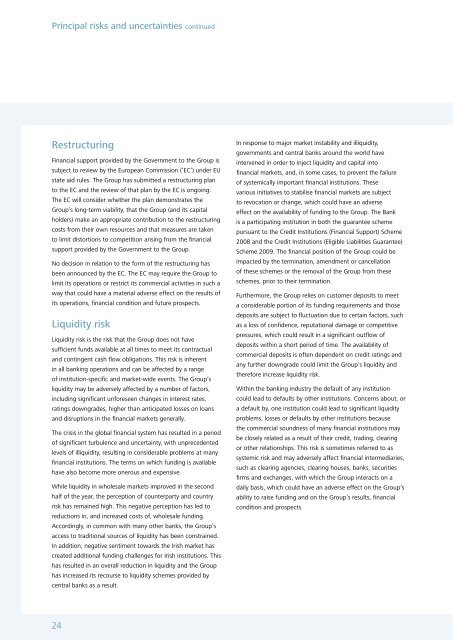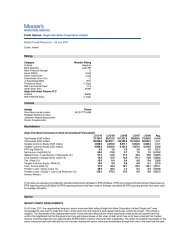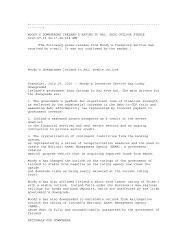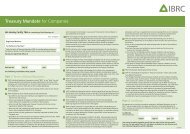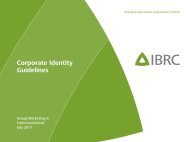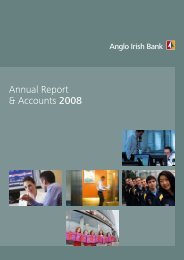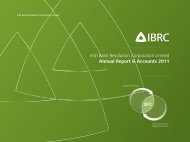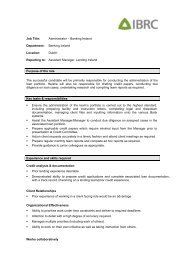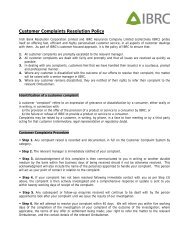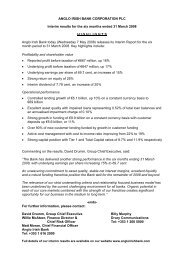Annual Report & Accounts 2009 - Anglo Irish Bank
Annual Report & Accounts 2009 - Anglo Irish Bank
Annual Report & Accounts 2009 - Anglo Irish Bank
You also want an ePaper? Increase the reach of your titles
YUMPU automatically turns print PDFs into web optimized ePapers that Google loves.
Principal risks and uncertainties continued<br />
Restructuring<br />
Financial support provided by the Government to the Group is<br />
subject to review by the European Commission (‘EC’) under EU<br />
state aid rules. The Group has submitted a restructuring plan<br />
to the EC and the review of that plan by the EC is ongoing.<br />
The EC will consider whether the plan demonstrates the<br />
Group’s long-term viability, that the Group (and its capital<br />
holders) make an appropriate contribution to the restructuring<br />
costs from their own resources and that measures are taken<br />
to limit distortions to competition arising from the financial<br />
support provided by the Government to the Group.<br />
No decision in relation to the form of the restructuring has<br />
been announced by the EC. The EC may require the Group to<br />
limit its operations or restrict its commercial activities in such a<br />
way that could have a material adverse effect on the results of<br />
its operations, financial condition and future prospects.<br />
Liquidity risk<br />
Liquidity risk is the risk that the Group does not have<br />
sufficient funds available at all times to meet its contractual<br />
and contingent cash flow obligations. This risk is inherent<br />
in all banking operations and can be affected by a range<br />
of institution-specific and market-wide events. The Group’s<br />
liquidity may be adversely affected by a number of factors,<br />
including significant unforeseen changes in interest rates,<br />
ratings downgrades, higher than anticipated losses on loans<br />
and disruptions in the financial markets generally.<br />
The crisis in the global financial system has resulted in a period<br />
of significant turbulence and uncertainty, with unprecedented<br />
levels of illiquidity, resulting in considerable problems at many<br />
financial institutions. The terms on which funding is available<br />
have also become more onerous and expensive.<br />
While liquidity in wholesale markets improved in the second<br />
half of the year, the perception of counterparty and country<br />
risk has remained high. This negative perception has led to<br />
reductions in, and increased costs of, wholesale funding.<br />
Accordingly, in common with many other banks, the Group’s<br />
access to traditional sources of liquidity has been constrained.<br />
In addition, negative sentiment towards the <strong>Irish</strong> market has<br />
created additional funding challenges for <strong>Irish</strong> institutions. This<br />
has resulted in an overall reduction in liquidity and the Group<br />
has increased its recourse to liquidity schemes provided by<br />
central banks as a result.<br />
24<br />
In response to major market instability and illiquidity,<br />
governments and central banks around the world have<br />
intervened in order to inject liquidity and capital into<br />
financial markets, and, in some cases, to prevent the failure<br />
of systemically important financial institutions. These<br />
various initiatives to stabilise financial markets are subject<br />
to revocation or change, which could have an adverse<br />
effect on the availability of funding to the Group. The <strong>Bank</strong><br />
is a participating institution in both the guarantee scheme<br />
pursuant to the Credit Institutions (Financial Support) Scheme<br />
2008 and the Credit Institutions (Eligible Liabilities Guarantee)<br />
Scheme <strong>2009</strong>. The financial position of the Group could be<br />
impacted by the termination, amendment or cancellation<br />
of these schemes or the removal of the Group from these<br />
schemes, prior to their termination.<br />
Furthermore, the Group relies on customer deposits to meet<br />
a considerable portion of its funding requirements and those<br />
deposits are subject to fluctuation due to certain factors, such<br />
as a loss of confidence, reputational damage or competitive<br />
pressures, which could result in a significant outflow of<br />
deposits within a short period of time. The availability of<br />
commercial deposits is often dependent on credit ratings and<br />
any further downgrade could limit the Group’s liquidity and<br />
therefore increase liquidity risk.<br />
Within the banking industry the default of any institution<br />
could lead to defaults by other institutions. Concerns about, or<br />
a default by, one institution could lead to significant liquidity<br />
problems, losses or defaults by other institutions because<br />
the commercial soundness of many financial institutions may<br />
be closely related as a result of their credit, trading, clearing<br />
or other relationships. This risk is sometimes referred to as<br />
systemic risk and may adversely affect financial intermediaries,<br />
such as clearing agencies, clearing houses, banks, securities<br />
firms and exchanges, with which the Group interacts on a<br />
daily basis, which could have an adverse effect on the Group’s<br />
ability to raise funding and on the Group’s results, financial<br />
condition and prospects.


